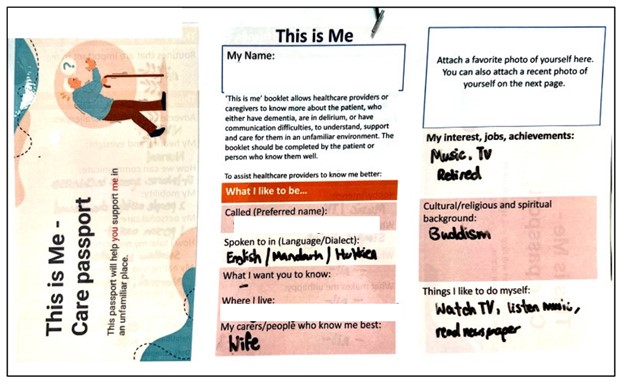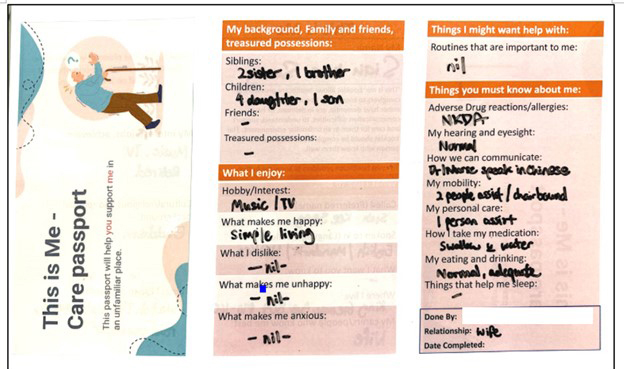Nurse Clinician Ye Li Zhen is from Ward 64A where she mostly looks after elderly patients. “It is stressful. About a third of my patients are restrained. These patients have dementia or delirium so they live in a world of their own and have high fall-risk. We restrain them to prevent them from getting out of bed and injuring themselves. When they cannot get their freedom, they will keep screaming, which is very distressing. We want to remove their restraints but we can’t as they are for their safety.”
Li Zhen’s QI Project, “This is Me – Care Passport”, is a gamechanger. The simple double-sided A3 document is for patients with dementia or delirium. Filled in by the patient or his caregiver, the ‘Care Passport’ arms the care team with information such as the patient’s habits and preferences. Such intel gives the care team insight to the patients’ behaviour enabling them to calm the patient down, stabilise him mentally and take the patient off restraints and discharge him.
Explains Li Zhen, “I had a patient who transferred in after five days from another SGH ward where he kept trying to get out of bed. As his risk of falling was high, the nurses had to restrain him. When he was admitted to my ward, with the help of the Care Passport, we understood that every time he wiggled in his bed and tried to climb out, it was because he wanted to change his diapers. So we would change his diapers every time he tried to get out of bed. After a day, we were really glad that we could remove his restraints as he didn’t try to get out of his bed anymore as he knew we would change his diapers for him. We were able to discharge him to a Transitional Care Facility once he was able to fulfil the required five days of good behaviour.”


“I also had a delirium patient admitted in restraints. He refused to eat and drink. Through the Care Passport, we found out that he usually drinks from a metal cup and asked his son to bring it. My staff were so amazed when we saw how readily he drank once we used the metal cup! The Care Passport also revealed that he likes to drink milo. So every time he shouted, we knew he just wanted some milo. After three days, the patient settled down and we were able to remove his restraints,” shares Li Zhen.
Li Zhen got the idea for the Care Passport in 2019 from a similar document that she saw when she did her Health Manpower Development Plan training at the Geriatric Ward in Guys and St Thomas Hospital, London.
“I felt it would really benefit our dementia and delirium patients, and help us to understand them better. I was eager to create and implement the passport when I got back but it was not possible. Shortly after returning, COVID-19 hit and all our efforts were focused on battling the pandemic. When we stepped down COVID-19 efforts in 2023, I finally got the green light. Then I quickly went about getting my fellow nurses’ buy-in by explaining to them how the Care Passport would help them to manage demented and delirium patients easier.”
See the spark in the mundane
The Care Passport is just one of 15 QI projects under Li Zhen’s belt. What drives her to do QI projects? “Whenever I see good outcomes from the changes, it motivates me to do more,” Li Zhen explains.
She gets ideas for QI Projects from problems that she and her nurses encounter in their daily work. Shares Li Zhen, “For example, a lot of elderly patients in my ward are hearing-impaired. It was difficult to communicate with them. If they had to be sent for procedures, our nurses would have to send them to the procedure so that they can talk to the staff on the patient’s behalf. If it was an MRI scan, the nurse would have to spend about an hour facilitating the communication. So I decided to do a QI Project.
As a result, we bought a personal listening device for our ward. Now, whenever we have a hearing-impaired patient, we use it. Instead of nurses, we now get our porters to send hearing impaired patients for procedures. This is possible now because we have the device, which enables our porters to communicate with the hearing impaired patients. Our nurses are very happy because they have been freed up to do other work.”
So QI is a win-win for both patients and healthcare providers. Patients will experience better care. And often, healthcare workers are freed up to pursue higher value-add work.
The personal listening device that NC Li Zhen and her nurses use to communicate with hearing-impaired patients in Ward 64A.
Start small, grow big
It came as no surprise when Li Zhen was crowned Quality Improvement Star of the Year 2023. Her passion for QI extends beyond her own projects. She actively mentors a group of junior nurses, encouraging them to contribute to QI initiatives. Her advice to her junior nurses is simple: Start small and keep learning.
NC Ye Li Zhen receiving her 2023 QI Star of the Year Award
Recognising the value of hands-on experience, she eases them into quality improvement by starting them as members of existing QI project teams. “I guide them step-by-step on what to do,” she shares.
This approach of practical experience coupled with proper guidance - allows them to gain first-hand knowledge in applying methodologies, collecting data, communicating with stakeholders, and conducting training.
Consequently, they develop confidence and build the necessary skills to tackle larger projects independently over time.
A message of encouragement
Li Zhen has a message for junior nurses interested in doing QI projects. “I remember how intimidating it was, to start on a QI journey, especially when I was a junior nurse,” recalls Li Zhen. “But I encourage you - Never give up; keep on trying. The first step might seem daunting, but the rewards are immense. The process itself is enriching, and the impact on patients and colleagues is truly fulfilling. So, take a deep breath, plunge into the unknown, and join the ranks of QI Stars!"
Have an improvement idea but not sure where to start? Colleagues can email the team at Process Transformation & Improvement!
